HIC’s cross–regional learning to advocate for meaningful climate justice now available in a podcast episode
HIC co-learning spaces are cross-regional, multi-session encounters open to all HIC Members, Friends and allies to generate and multiply emancipatory learning practices applied on the defense of human rights related to habitat.
> What makes our co-learning spaces unique experience?

They are cross-regional
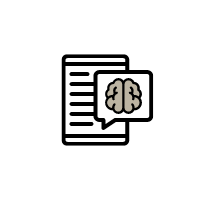
The pedagogic approach

A diverse team of facilitators
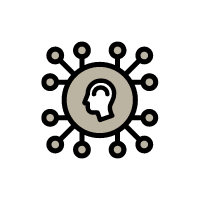
The learning models

They are cross-regional

The pedagogic approach

A diverse team of facilitators

The learning models
> Thematic focus of each Co-learning Space
Civil Society Action for climate justice and social production of habitat – phase 2023-24
This second phase will endeavor to support and enhance the efforts of HIC Members and allies to prioritize, strategize, learn and act together by building their social force for mobilization, collective action and advocacy on climate justice and social production of habitat across Latin America, Sub-Saharan Africa and Middle East/North Africa.
Climate justice
Social production of Habitat
Civil Society Action for Gender and Land Policy Impact – phase 2021-2022
The first phase of the co-learning spaces emerged as a response to HIC Member priorities to strengthen the social force of HIC in key thematic areas that included Feminist Approaches to Habitat, Land Rights and Multi-Sphere Advocacy. Along these 3 tracks, the co-learning spaces aimed to uphold and defend human rights related to habitat bringing to the fore a feminist habitat agenda while equipping Members and Allies for collaboration in policy-level engagements and advocacy toward human rights-based solutions to habitat problems as they manifest across the HIC regions of sub-Saharan Africa, Middle East and Latin America.
Feminist approaches to habitat
Multi-level advocacy
Land rights
> Reflections
> Beyond the co-learning spaces:
Interregional working groups on Feminist Approaches to Habitat and Human Right to Land
The need for continuous engagement and further interregional collaborations on Feminist Approaches to Habitat and the human right to land, was evident upon the conclusion of the Co-Learning spaces. The participants and facilitators were highly motivated to keep the ties and extend the opportunity to continue the interregional conversation and work collectively on the identified common issues and strategies. This has informed the HIC-GS action towards supporting its members and allies into creating active working groups on feminist approaches to habitat that would build on the foundations set by the co-learning space and serve as space for joint work and collaboration between HIC members in global advocacy activities and initiatives related to gender, feminism and women’s rights and their intersection with habitat rights.
Focus of the working group
- Cross-regional coordination and advocacy around key priorities and processes;
- Supporting the mainstreaming of gender equality in HIC’s global advocacy;
- Supporting cross-regional coordination between HIC members for global advocacy;
- Deepening discussions and knowledge exchanges that started in the co-learning space:
Membership
Open to all HIC Members and Allies with an interest in the thematic focus.
HIC regional working groups
Priority areas
Advocacy spaces
- Universal Periodic Reviews (of human rights records in all 193 UN member states)
- UN Special Rapporteurs (March 2023 – Right to Housing in context of climate change)
- Committee on Economic Social and Cultural Rights (CESCR)
- General Comment on the Human Right to Land
- UN Commissions (CSW, CSocD)
- UN Committees (CEDAW)
- Agenda 2030: SDGs and the VNRs
- HLPF – 6 (Water & Sanitation) ,7 (Affordable & Clean Energy) , 9 Industry, Innovation & Infrastructure, SDG 11 (Sustainable Cities) ,17 (Partnerships to Achieve all SDGs)
- New Urban Agenda – UN Habitat (Executive Board, Habitat Assembly, Committee of Permanent Representatives, WUF)
- Habitat Assembly – Stakeholder Engagement Mechanism
- UN Framework Convention on Climate Change (UNFCC) + annual Conference of Parties (COP) – Intergovernmental Panel on Climate Change (IPCC)

> Feminist Approaches to Habitat
Feminist Approaches to Habitat.
Based on the results of the survey addressed to HIC members and allies, the feminist approach to habitat emerged as a key and necessary theme with about 85% of the responses indicating an interest in participating and learning in the co-learning space on feminist approaches, particularly in these key areas; Policy Analysis and Advocacy Strategies, feminist urbanism and habitat and Human Rights Norms and Standards on Women’s Rights Related to Habitat.
Based on the results of the survey addressed to HIC members and allies, the feminist approach to habitat emerged as a key and necessary theme with about 85% of the responses indicating an interest in participating and learning in the co-learning space on feminist approaches, particularly in these key areas; Policy Analysis and Advocacy Strategies, feminist urbanism and habitat and Human Rights Norms and Standards on Women’s Rights Related to Habitat.
Over the month of February 2021, 62 HIC Members, friends and allies engaged in 4 sessions in which we learnt together about the local, regional and global histories of feminist struggles,violences and inequalities, care and other works, and feminist advocacy strategies. These sessions were guided by 4
key objectives:
Session 1 was an educational session in which we explored the history and importance of the feminist work of Habitat, discussed the issues and stories we collected and explain their effects, what worked and what didn’t work including milestones in feminist advocacy:The international advancement of women, the regional milestones, Durban for Africa, Belen do Para for Latin America, the Middle East, Yogyakarta Principles https://yogyakartaprinciples.org/principles-en/
Session 2 focused on Inequalities and violences with an objective to raise awareness and make visible the violence and inequalities experienced by women and sexual/gender diversities in the territories, due to their differential and intersectional access to habitat right.
Session 3 looked at care and the workplace, particularly to recognize women’s contributions to the informal economy and factors preventing their full participation, analyze and explore redistribution-recognition, revalorization of care work and promote co-responsibilities in different spheres, develop strategies for enhancing economic empowerment (and autonomy) of women and diversities in various local spheres and Identify engagement spaces including key calendar dates for advocacy towards women and the workplace.
The Co-Learning space concluded with session 4 that interrogated feminist advocacy strategies including facilitating articulations among the participating organizations to promote political advocacy in favor of women’s right to habitat and development of tools and methodologies (campaigns, agendas, using creative approaches) for collective/community work with women’s groups in each region to identify their needs.
Links to Session Materials.
Feminist Approaches to Habitat Co-Learning Space
Available at Soundcloud / Spotify
1st episode: Why feminist approaches to habitat? history and journey in different regions of the world
Feminist Approaches to Habitat Co-Learning Space
Session 1 Speaker’s material:
Ana Falu’s presentation: English, French, Spanish, Arabic
Ana Falu and Fides presentation: English,French, Spanish
Maite Rodriguez Blandon’s presentation: Spanish, French, English
Session 2 Speaker’s material:
Dorothy Baziwe’s presentation: English, French, Spanish and Arabic
Yamila Millanao’s presentation: English, French, Spanish and Arabic
Rana Ghanem’s presentation: English, French, Spanish and Arabic
Nadia Zuniga’s presentation: English, French, Spanish and Arabic
Corporacion Region: English, French, Spanish
Korotimy Thera presentation: English, French, Spanish
Session 3 Speaker’s material:
CEDEPO presentation: English, French, Spanish
SEDECA presentation: English, Arabic, French , Spanish
Session 4 Speaker’s material:
Hazem presentation: English, Arabic, French and Spanish
Inaam Al-Asha presentation: English, Arabic, French and Spanish
Feminist Approaches to Habitat:
62 accepted applications, with interest from across the world in the syllabus: 11 Africa Region, 40 Latin America Region, 8 MENA and 3 from other regions
> Social Production of Habitat
The Social Production of Habitat Co-Learning Sessions will be held in the month of November on the 9th,16th, 23rd and 30th.
- Every Thursday in November, that is the 9th,16th, 23rd, 30th from 5pm-7pm SAST (check your local time here)
- Register here: https://us06web.zoom.us/meeting/register/tZUpcO6sqj4sHtKPbN-rgnVGRktlBkoR8IiD
- The registration will be open till the 3rd November for Social Production of Habitat
General Objective
The overall goal of the Social Production of Habitat Co-Learning Space: To build a common understanding among HIC Members, Friends, and Allies about concepts and practices of Social Production of Habitat to raise our collective and global voice for political action and joint advocacy strategies in this matter.
Cross-cutting issues to consider in each session:
- The human rights dimension of SPH: the relationship between Social Production of Habitat and human rights related to habitat (housing, land, water, etc.) and the States’ obligations in this matter.
- The interlinkage between Social Production of Habitat and climate justice.
- Feminist perspectives on Social Production of Habitat
- The importance of rooting SPH in social movements, their struggles, and strategies.
- The need to highlight the political values and principles underpinning SPH as a means to counteract the commodification of housing and land and the instrumentalization of civil society – the latter also includes the issue of States responsibilities.
Focus of the four Co-Learning Sessions:
- Session 1 – Contextualization, origin, and journey of Social Production of Habitat in HIC and across regions towards a common understanding.
- Session 2 – Social Production of Habitat in practice, experience sharing, outcomes, and lessons learnt.
- Session 3 – International and national legal and public policy frameworks and instruments on Social Production of Habitat
- Session 4 – Defining a common voice and objectives for advancing a HIC advocacy and mobilization agenda on Social Production of Habitat.
SESSION 1: CONTEXTUALIZATION, ORIGIN AND JOURNEY OF SOCIAL PRODUCTION OF HABITAT IN HIC AND ACROSS REGIONS TOWARDS A COMMON UNDERSTANDING.
General learning objective:
To contextualize the emergence and development of Social Production of Habitat processes in each region, and within the history and current life of HIC, towards building a common understanding of SPH in the framework of the right to adequate housing and other human rights related to habitat.
Specific learning objectives:
- To explore the different regional contexts, events, processes, and challenges on the right to adequate housing, land rights and other human rights related to habitat that led to the development and consolidation of the concept and practice of Social Production of Habitat, acknowledging the HIC internal journey on this matter initiated at Latin America.
- To unpack the concept of Social Production of Habitat by looking at its elements and features -including community self-management, housing use value instead of exchange value, people and nature centered approach instead of market, collective ownership to protect territories from speculation and financialization-, by sharing how is it understood regionally according to the pathways it offers to advance habitat related rights, and by identifying similar and cross-cutting principles, values, and practices towards an inclusive recreation of the concept along the Co-learning Space sessions.
SESSION 2: SOCIAL PRODUCTION OF HABITAT IN PRACTICE, EXPERIENCE SHARING, OUTCOMES AND LESSONS LEARNT.
General learning objective:
To share and learn from concrete and transformative Social Production of Habitat experiences in different regions to identify good practices, models, and strategies.
[Note: As indicated in “Utopias under construction”, SPH experiences can be considered “transformative” when they have self-managed aspects, care about environment, promote social and solidarity economy, remain over time, and even motivate legislative or public policy changes.]
Specific learning objectives:
- To share practical experiences and lessons learnt from Social Production of Habitat processes in different regions that succeeded in the development and improvement of housing and neighbourhoods, acknowledging both the challenges faced and the key strategies put in place by inhabitants and social organizations that led to the solutions of problems and main achievements.
- Collectively reflect on the elements, principles, and cross-cutting issues of Social Production of Habitat (such as gender and care, access to land, link to environmental issues and climate justice) that can be identified in the shared experiences and discuss about the challenges and opportunities that organizations have in other regions.
SESSION 3: INTERNATIONAL AND NATIONAL LEGAL AND PUBLIC POLICY FRAMEWORKS AND INSTRUMENTS ON SOCIAL PRODUCTION OF HABITAT.
General learning objective:
To acknowledge and analyse the global, regional, national and/or subnational legal and public policy frameworks and instruments that contribute to Social Production of Habitat processes.
Specific learning objectives:
- To review the international agreements, legal and policy frameworks which include recommendations or relevant aspects for Social Production of Habitat such as Habitat I, the New Urban Agenda, the 2030 Agenda on Sustainable Development, the Paris Agreement, and the General Comment N° 26 on land and economic, social, and cultural rights.
- To share national and/or subnational cases where Social Production of Habitat has been successfully adopted in legal and public policy frameworks and where social movements promote new proposals to reform, improve or develop such frameworks, drawing lessons for collective action in regions where laws and policies are not favourable to SPH.
(Note: Social Production of Habitat needs specific and supportive instruments to flourish like in some country, city, or municipality cases in Latin America. On the other hand, the instruments designed for housing construction by the private sector cannot be applied to SPH.)
SESSION 4: DEFINING A COMMON VOICE AND OBJECTIVES FOR ADVANCING A HIC ADVOCACY AND MOBILIZATION AGENDA ON SOCIAL PRODUCTION OF HABITAT.
General learning objective:
To start a strategic discussion towards a cross-regional advocacy and mobilization action plan by identifying the transformative potential of Social Production of Habitat and what we want to achieve as a Coalition and defining a common voice and clear objectives to continue fostering HIC’s international agenda.
Specific learning objectives:
- To reflect on the definition of Social Production of Habitat historically coined by HIC, considering the contexts, experiences and struggles shared during the Co-Learning Space, to reaffirm or develop a common voice that allows us to advocate and mobilize more forcefully.
- To prioritize common axes of struggles and agree on recommendations and steps towards a cross-regional strategic action work plan for advocating Social Production of Habitat and successfully attain human rights objectives by using it, including strategies to advance cross-regional mobilisation and spaces where advocacy can be carried out.
More info coming soon
More info coming soon
> Multi Level Advocacy
Multi-level Advocacy Co-Learning Space
Session 1 Speaker’s material:
Lauren Royston presentation: English, Spanish
Margarete Uemura presentation: English, French, Spanish, Arabic
Session 2 Speaker’s material:
Christian Courtis presentation: English, French, Spanish, Arabic
Wesam Ahmad presentation: English,Spanish, French
Session 3 Speaker’s material:
Samuel Olando presentation: English, French, Spanish
Session 4 Speaker’s material:
Multi Level Advocacy
105 accepted applications, with interest from across the world in the syllabus: 45 Africa Region, 29 Latin America Region, 25 MENA and 6 other
> Land Rights
Session 1 Speaker’s material:
Joseph Schechla presentation: English, French, Spanish, Arabic
Leila Riahi presentation: English, French, Spanish, Arabic
Nevine Ebeid presentation: English, French, Spanish, Arabic
Sam Ikua presentation: English, French, Spanish, Arabic
Sophie Takuva presentation: English, French, Spanish, Arabic
Session 2 Speaker’s material:
Dorothy Baziwe presentation: English, French, Spanish
Jamal Taleb presentation: English, French, Spanish, Arabic
Lauren Royston presentation: English, French,Spanish, Arabic
Tatiana Alfonso presentation: English, French, Spansh
Session 3 Speaker’s material:
Ahmed Mansour presentation: English, French, Spanish
Elhamy al-Merghani presentation: English, French, Spanish, Arabic
Stanilas Kamengele presentation: English, French, Spanish
Session 4 Speaker’s material:
Grace Chikomo presentation: English, French, Spanish
Gustavo Gonzalez presentation: English, French, Spanish
Iraida Morocoima presentation: English, French, Spanish
Land Rights
90 accepted applications, with interest from across the world in the syllabus:40 Africa Region, 28 Latin America Region, 12 MENA and 10 Other
> Climate Justice
- Sessions overview
- Objectives of the sessions
- 1st session - 5 October 2023
- 2nd session - 12 October 2023
- 3rd session - 19 October 2023
- 4th session - 26 October 2023
- Recording of the sessions
- Facilitators
The Climate Justice Co-Learning Sessions will be held in the month of October on the 5th, 12th, 19th and 26th.
- Every Thursday in October, that is the 5th, 12th, 19th, 26th, from 5pm-7pm SAST (check your local time here)
- Register here: https://us06web.zoom.us/meeting/register/tZIud-CsqDwsHtd2Tztx1ByNvvEyzHopQT8d
- The registration will be open till the 29th October for Climate Justice
The Co-Learning Space on Climate Justice will create a cross-regional team of 6 people (2 from Africa, 2 from MENA and 2 from Latin America) that will plan, implement and help in the follow-up of the four Co-Learning Space sessions. Facilitators will contribute their experience in climate justice and their specific regional perspective in the organization and development of the HIC Co-Learning space and a corresponding strategic action plan to promote and advocate for climate justice.
The overall goal of the Climate Justice Co-Learning Space: Together, we seek to develop a common understanding among members and friends of HIC on how to advance climate justice and habitat-related rights, from a cross-regional perspective and in light of diverse experiences and levels of vulnerability and influence, in order to co-develop a pro-climate justice approach based on the human rights agenda and global development.
Learning objectives
Cross-cutting issues:
- Defining and redefining climate change and climate justice.
- International law and intersection between climate justice and human rights
- A comprehensive approach to climate justice considering urban, rural and gender dimensions, including the rights of women and girls, rights of displaced people, migrants and refugees
- Why the fight for the right to land, housing water and food is a fight for climate justice; we have ‘The intersection of climate justice with habitat-related rights, including housing, land, water, and food among others. (Land rights and their connection to climate justice).
- Priority issues (comprehensiveness of adaptation measures – defining the issue of loss and damage, technological transfer, learning and green transformation)
Objectives for the first session: To redefine climate change and climate justice
- Defining climate change and its drivers as an environmental, economic, political and social matter including a brief history of the Paris Accord and precedents as approaches to tackling climate change
- Defining and advancing climate justice
- [Drivers] Understanding the systemic issues that contribute to the climate crisis and related injustices across and within regions and generations
- [Impacts] Determining the impacts and climatic injustices, disproportionately affecting the most vulnerable groups – women, children, elderly, indigenous peoples, including rural and urban communities (how climate injustice intensifies pre-existing inequalities and unequal access to the rights)
- Clarify the most prominent problems and strategies adopted in each region
Objective for the second session: To exchange on the legal and policy framework of climate justice.
- Climate justice as a human rights-based issue- understanding the context.
- Determine the international and regional legal frameworks that relate to climate justice
- How to use the human rights approach in advocacy related to climate justice
Objective for the third session: To identify the differences and similarities of common struggles and strategies across different contexts and regions.
- Identifying solutions, measures, policies and strategies by communities, civil society organizations and governments
- Knowledge of the methodologies and tools by which society operates in order to further the interdependence of struggles
- Highlighting the most important priorities that can be worked on and sectors regionally and across regions
- Highlighting local success stories that can inspire people to work together.
Objective of the fourth session: To pluralize our advocacy work, target key advocacy processes and to craft together our advocacy strategies and messages
- Identifying the existing advocacy spaces based on the long history of the struggle of civil society organizations and HIC members – and advocacy opportunities in justice and climate issues and their intersection with Habitat.
- To facilitate coordination among the participating organizations to promote political advocacy on climate justice in favour of women’ rights and marginalized groups on housing, food, water and land
- Advancing Climate Justice: Creating a cross-regional advocacy agenda, building on the outcomes of previous sessions
- Identifying the common point between the regions in order to launch the advocacy agenda in connection with our strategic objectives of the food sovereignty, the Loss and Damage Fund & Understanding and localising climate finance flows across mitigation and adaptation and loss and damage fund.
- Date: Thursday, 5 October 2023
- Time: 5pm-7pm SAST (check your local time here)
- Interpretation: Arabic, English, French, Spanish

The objective of the first session is to define and redefine climate change and climate justice, including:
-
Defining climate change and its drivers as an environmental, economic, political and social and human rights matter.
-
Defining and advancing climate justice in relation to habitat
-
Determining the impacts and climatic injustices, disproportionately affecting the most vulnerable groups
- Date: Thursday, 12 October 2023
- Time: 5pm-7pm SAST (check your local time here)
- Interpretation: Arabic, English, French, Spanish
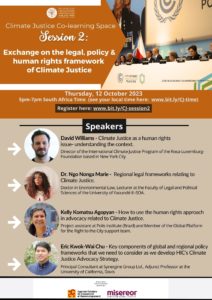
The objective of the second session is To exchange on the legal, policy and human rights framework of climate justice, including:
-
-
Climate justice as a human rights issue- understanding the context.
-
Determining the international and regional legal frameworks that relate to climate justice
-
How to use the human rights approach in advocacy related to climate justice
-
Key components of global and regional policy frameworks that we need to consider as we develop HICs Climate Justice Advocacy Strategy
-
- Date: Thursday, 19th October 2023
- Time: 5pm-7pm SAST (check your local time here)
- Interpretation: Arabic, English, French, Spanish
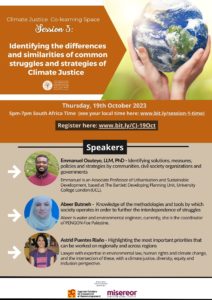
The objective of the third session is To identify the differences and similarities of common struggles and strategies of climate justice across different contexts and regions, including:
-
Identifying solutions, measures, policies and strategies by communities, civil society organizations and governments
-
Knowledge of the methodologies and tools by which society operates in order to further the interdependence of struggles
-
Highlighting the most important priorities that can be worked on and sectors regionally and across regions
-
Highlighting local success stories that can inspire people to work together
-
Date: Thursday, 26th October 2023
-
Time: 5pm-7pm SAST (check your local time here)
-
Interpretation: Arabic, English, French, Spanish
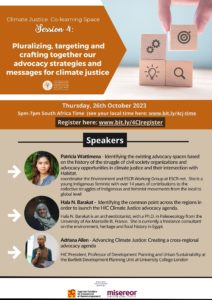
The objective of the fourth session is To pluralize our advocacy work, target key advocacy processes and to craft together our advocacy strategies and messages including:
-
Identifying the existing advocacy spaces based on the long history of the struggle of civil society organizations and HIC members – and advocacy opportunities in justice and climate issues and their intersection with Habitat.
-
To facilitate coordination among the participating organizations to promote political advocacy on climate justice in favour of women’ rights and marginalized groups on housing, food, water and land
-
Advancing Climate Justice: Creating a cross-regional advocacy agenda, building on the outcomes of previous sessions
-
Identifying the common point between the regions in order to launch the advocacy agenda in connection with our strategic objectives of the food sovereignty, the Loss and Damage Fund & Understanding and localizing climate finance flows across mitigation and adaptation.
Defining and redifining Climate Justice
Our speakers included:
– Enrique Viale, Environmental Lawyer and founder of the Argentine Association of Environmental Lawyers, Argentina.
– Adriana Allen, HIC President, Professor of Development Planning and Urban Sustainability at the Bartlett Development Planning Unit at University College London.
– Priscilla Achakpa, Global Lead of the Women Environmental Programme (WEP), a regional Women-focused organization with headquarters in Abuja, Nigeria.